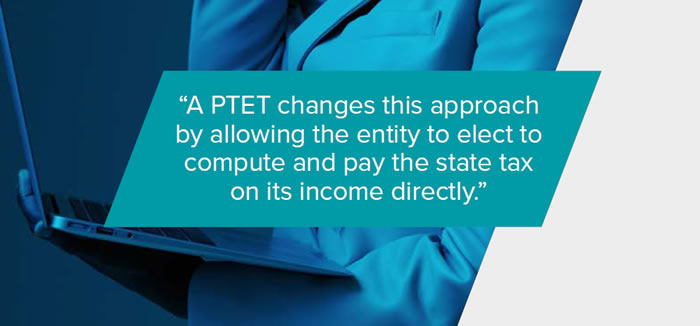Decoding PTET: The IRS-Approved SALT Deduction Workaround for Pass-Through Entities
By Loredana Scarlat, Director, Tax & Business Services
As of May 31, 2023, various forms of pass-through entity tax laws have been adopted in 36 states and one locality (New York City). For many taxpayers, the mechanisms and benefits of these relatively new provisions are not fully understood.
Since passing the Tax Cuts and Jobs Act, P.L. 115-97, which limited individual deductions for state and local income to $10,000, taxpayers and their advisors have sought various workarounds to overcome this limitation.
Although many of these past initiatives have not been successful, pass-through entity tax provisions have received the much-desired IRS nod. In Notice 2020-75, the IRS specified that the payment of a PTET to domestic jurisdiction is deductible in computing the entity’s nonseparately stated income or loss without this deduction being subject to the $10,000 cap.
Background
Generally, pass-through entities do not pay taxes at the entity level. Instead, as the name indicates, entities such as partnerships, LLCs, or S corporations “pass-through” all items of income, gain, deductions, credits, and losses to their partners/shareholders, who then report all these items and pay the associated tax on their personal tax returns.

The amount of state tax paid becomes a deduction reducing ordinary income for federal income tax purposes, very much in the same way local taxes or payroll taxes offset ordinary income. By lowering the ordinary income, the respective shareholders/partners report less pass-through income on their federal tax returns, effectively deducting the state income taxes, which would otherwise be limited.
Who does the PTET benefit?
Operating pass-through business (LP, LLC, S corporation) that ‘resides’ in a high-tax jurisdiction or whose members reside in high-tax jurisdictions should definitely consider the benefits of a PTET election. It is worth noting the election is made at the entity level and not at the partner level, so advance coordination and attention to this individual benefit is needed. Managing members must examine the opportunity well in advance of compliance season.
Even if the entity does not ‘reside’ in high-income tax jurisdiction, the PTET may still be tax advantageous if the entity anticipates allocating income to a high-tax jurisdiction (an example would be a Texas-based entity with income sourced in New York).
Is the PTET a good option for everyone?
The answer is: it depends. Whereas the benefits of PTET are evident for operating businesses and their active members, the answer is not as straightforward when considering certain members that are inherently passive, such as trusts or various investors in investment partnerships (family limited partnerships, in particular).
PTET for individual passive investors and trusts
The PTET is a deduction taken at the Federal level against ordinary income and as a credit at the state level. One particular trait of investment partnerships is that they do not generate large amounts of ordinary income. As such, it would not be uncommon to see an investment partnership report the PTET deduction as its sole ordinary income deduction or for the PTET deduction to exceed any ordinary income, thus generating an ordinary loss. This would not be an issue for an investor who is also actively involved in managing the fund. However, for a passive investor, this deduction is deemed as a passive deduction that can only be offset by passive income. If that investor does not have enough passive income to offset the passive deduction, the PTET deduction gets suspended and carried over to a future year until that investor either reports enough passive income to absorb the passive loss, disposes of their interest in the entity or…dies.
As is often the case, there are timing differences between the PTET credit claimed on that state’s return and the PTET deduction. The credit is claimed based on the entity’s payments, including those made in the following year, such as those for the fourth quarter or even those made with the extension. In contrast, the federal deduction for a cash-basis entity taxpayer would strictly include the payments made before the entity year-end.
Additional consideration should be given to the interplay between passive activity loss rules, timing of the federal deduction, and state add-backs, especially when income is expected to swing significantly from year-to-year.
When it comes to trusts, irrevocable grantor and non-grantor trusts should consider the impact of making a pass-through entity (PTE) state income tax election. For instance, in certain states, only grantor trusts can pass the PTET credit to the beneficiary, whereas other types of trusts retain the credit at the trust level.
A benefit of irrevocable grantor trusts is that the trust can grow unburdened by income taxes because the grantor pays the income tax liability on the trust’s income. The payment of the trust’s income tax liability by the grantor further reduces the grantor’s taxable estate and is not considered a gift to the trust, provided that the requirements of Rev. Rul. 2004-64 are met. When an irrevocable grantor trust makes a PTE state income tax election, the state income taxes are paid by the PTE on the trust’s share of state income. If the tax liability is shifted to the entity level, the trust ultimately bears the tax cost, not the grantor. Thus, the estate and gift tax benefit of the grantor paying the state income tax on the trust’s PTE state income is lost when the PTE state income tax election is made.
We think reimbursing the trust for state income tax paid due to the PTE state income tax election would be deemed a taxable gift. However, there is no guidance from the IRS on this issue. Many states have issued guidance for non-grantor trusts that make a PTE state income tax election. Some states have specified the credit for state income tax paid is available only to the trust and not to the beneficiary. Some states do not allow trusts to make the PTET election altogether.
In those states where trusts are allowed to make the PTET election, non-grantor trusts that distribute all the trust’s distributable net income to beneficiaries can lose the benefit of the PTE state income tax election in certain states if the credit is not refundable. Some states allow for a carryforward of the credit; however, if the trust regularly distributes or is required to distribute income every year, the benefit of the PTE state income tax election would likely be lost.
Each of the 36 states that have adopted different versions of the PTET, and the computation mechanics can be quite intricate. Some states allow overpayments to be credited, whereas others mandate overpayments be refunded. PTET deduction is a powerful new tax planning tool, and the Marcum SALT team has the instruction manual.





















